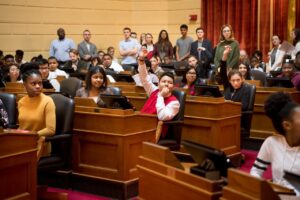by The Cowl Editor on February 8, 2018
Features
by Catherine Brewer ’20

“We are an assisted advocacy project that works to break down the root cause of the issue to reach our goals, and our purpose is to teach students to use their voice to reach their representatives,” exclaimed Cara McCluskey ’19 of this week’s Club Spotlight: Generation Citizen (PCGC). McCluskey is one of four GC chapter directors at Providence College, and she shares this role with Emily Conley ’20, Patrick Reynolds ’18, and Caleigh Rockwal ’19. “Our goal is to empower students to make an impact,” McCluskey added.
Although GC is still awaiting official approval from Student Congress, the chapter has been active on campus for a few years, and GC as a national organization is well established. GC was founded by eight Brown University students in 2008 with a mission to “ensure that every student in the United States receives an effective action civics education.” In 10 years, the organization has spread to the San Francisco Bay Area, Central Texas, Massachusetts, New York City, Oklahoma, and throughout Rhode Island.
To reach their goals, each GC chapter enlists student volunteer democracy coaches to bring the program into local schools and create their own lesson plans modeled on the organization’s standard framework. McCluskey explained that in PC’s program, Democracy Coaches are assigned classrooms in pairs by the head of the Providence chapter, Jaretta Konneh. The first two classes provide students with basic civic knowledge before they choose a class a community issue to focus on. “No two GC projects look the same,” said McCluskey. In her own experience, McCluskey worked at a high school in Providence where students felt that there was not enough English learning support. With that concern in mind, McCluskey and her partner democracy coach worked with students to determine two legislative issues to work on: that the school had inadequate English proficiencies required for legislation and that the lack of ESL aids was creating a learning divide among students.
“Though students have total control on what issue they want to work on, popular issues that classes choose are homelessness, bullying, police brutality, and increasing student voice in their schools,” said Konneh of projects in Providence that PCGC students are involved in. She explained that one of the most memorable projects she has worked on is improving the quality of lunch at Roger Williams Middle School.
After discussing the district and state requirements for nutrition with the Sodexo General Manager, the students decided to push for the establishment of a Student Food Advisory board. They created an outline for the purpose of the board, its positions, and meetings with Sodexo, and the students were even able to present their plans to the Health and Wellness sub-committee at the Providence School Board. “It was inspiring to see how motivated and successful the students were in achieving their goal, and also how well their democracy coaches [two PC social work majors] supported them,” praised Konneh.
Rockwal shared that the most rewarding part of her involvement with PCGC has been experiencing student growth. “The two times I have taught in a classroom, my students came in with very little knowledge of the American government and how to engage with it.” She explained that a new sense of confidence accompanied their learning, and that students who were once shy now had the courage to call their public officials. “Knowing that I played a part in that inspiration and that drive is a feeling unlike any I have ever had, and it’s what keeps me coming back to GC,” stated Rockwal.
After finding primary and follow-up tactics, the students work to have their voices heard by lobbying for their cause. “The GC program culminates at Civics Day, which for us is held at the State House,” said McCluskey. Students also prepare to present their work throughout the program to other Rhode Island groups, as well as community members and public officials.
In regard to the success of the student projects, Konneh explained that the results differ based on scale. “For example, if a class chose to work on a school based issue, it will have a high chance of being successful because students have exposure to teachers and administrators,” she stated. Some projects can be more difficult if they require the response of public officials, which can often be time consuming. However, Konneh maintains that the GC experience is ultimately rewarding for both students and DCs. Members of PCGC are surveyed at the end of each semester. “In the fall, 83 percent of participants expressed that GC has developed their leadership, communication, and time management skills, as well as strengthened their ability to effectively engage with people from differing backgrounds and perspectives,” said Konneh.
The PC Chapter of GC will be accepting applications on a rolling basis, but applicants are encouraged to act fast. “We are seeking committed, curious, and passionate college students who have a heart for service and care about social change,” Konneh revealed. Prospective students can apply at https://generationcitizen.formstack.com/forms/dc_application, and work study is also available.